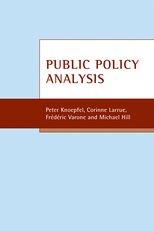 Public policy analysis
Public policy analysis
Contents
-
-
-
-
-
-
-
-
-
-
-
-
-
-
10.1 Definition of policy effects 10.1 Definition of policy effects
-
10.1.1 Impacts (observable among target groups) 10.1.1 Impacts (observable among target groups)
-
10.1.2 Outcomes (observable effects among the end beneficiaries) 10.1.2 Outcomes (observable effects among the end beneficiaries)
-
-
10.2 Policy evaluation criteria 10.2 Policy evaluation criteria
-
10.2.1 Impact (testing the intervention hypothesis) 10.2.1 Impact (testing the intervention hypothesis)
-
10.2.2 Effectiveness (testing the causal hypothesis) 10.2.2 Effectiveness (testing the causal hypothesis)
-
10.2.3 Efficiency (outcomes/resources) 10.2.3 Efficiency (outcomes/resources)
-
10.2.4 Relevance (objectives/public problem) and productive economy (outputs/resources) 10.2.4 Relevance (objectives/public problem) and productive economy (outputs/resources)
-
10.2.5 Evaluation criteria: overview and application logic 10.2.5 Evaluation criteria: overview and application logic
-
-
10.3 Evaluative statements on the effects of a public policy (product no 6) 10.3 Evaluative statements on the effects of a public policy (product no 6)
-
10.4 Evaluation process: the actors, resources and institutions mobilised 10.4 Evaluation process: the actors, resources and institutions mobilised
-
10.4.1 Institutionalisation of the evaluation 10.4.1 Institutionalisation of the evaluation
-
10.4.2 Actor constellations and games 10.4.2 Actor constellations and games
-
(a) Measures or policies to be evaluated (a) Measures or policies to be evaluated
-
(b) Evaluations and actors (b) Evaluations and actors
-
(c) Evaluations and the general political context (c) Evaluations and the general political context
-
-
-
Notes Notes
-
Notes Notes
-
-
-
-
-
-
-
Cite
Abstract
This chapter discusses the effects of policies and the ways in which they are examined. It provides operational definitions of the concepts of policy impacts, which take account of changes affecting target groups, and policy outcomes, which describe the effects actually generated among the end beneficiaries. It presents five criteria that are generally applied when evaluating the effects of a policy — extent of impact, effectiveness, efficiency, relevance, and productive economy. It notes that these two preliminary stages aid in identifying the form and content of the various evaluative statements that can be observed in political-administrative reality. It determines the principal actors of the evaluation stage, their direct and indirect games, and the resources and institutions mobilized during the process of the production of these evaluative statements.
Sign in
Personal account
- Sign in with email/username & password
- Get email alerts
- Save searches
- Purchase content
- Activate your purchase/trial code
- Add your ORCID iD
Purchase
Our books are available by subscription or purchase to libraries and institutions.
Purchasing information| Month: | Total Views: |
|---|---|
| October 2022 | 2 |
| November 2022 | 2 |
| February 2023 | 5 |
| March 2023 | 14 |
| April 2023 | 4 |
| May 2023 | 2 |
| November 2023 | 2 |
| December 2023 | 3 |
| January 2024 | 3 |
| February 2024 | 17 |
| April 2024 | 2 |
| May 2024 | 1 |
| June 2024 | 3 |
| November 2024 | 8 |
| December 2024 | 3 |


Get help with access
Institutional access
Access to content on Oxford Academic is often provided through institutional subscriptions and purchases. If you are a member of an institution with an active account, you may be able to access content in one of the following ways:
IP based access
Typically, access is provided across an institutional network to a range of IP addresses. This authentication occurs automatically, and it is not possible to sign out of an IP authenticated account.
Sign in through your institution
Choose this option to get remote access when outside your institution. Shibboleth/Open Athens technology is used to provide single sign-on between your institution’s website and Oxford Academic.
If your institution is not listed or you cannot sign in to your institution’s website, please contact your librarian or administrator.
Sign in with a library card
Enter your library card number to sign in. If you cannot sign in, please contact your librarian.
Society Members
Society member access to a journal is achieved in one of the following ways:
Sign in through society site
Many societies offer single sign-on between the society website and Oxford Academic. If you see ‘Sign in through society site’ in the sign in pane within a journal:
If you do not have a society account or have forgotten your username or password, please contact your society.
Sign in using a personal account
Some societies use Oxford Academic personal accounts to provide access to their members. See below.
Personal account
A personal account can be used to get email alerts, save searches, purchase content, and activate subscriptions.
Some societies use Oxford Academic personal accounts to provide access to their members.
Viewing your signed in accounts
Click the account icon in the top right to:
Signed in but can't access content
Oxford Academic is home to a wide variety of products. The institutional subscription may not cover the content that you are trying to access. If you believe you should have access to that content, please contact your librarian.
Institutional account management
For librarians and administrators, your personal account also provides access to institutional account management. Here you will find options to view and activate subscriptions, manage institutional settings and access options, access usage statistics, and more.